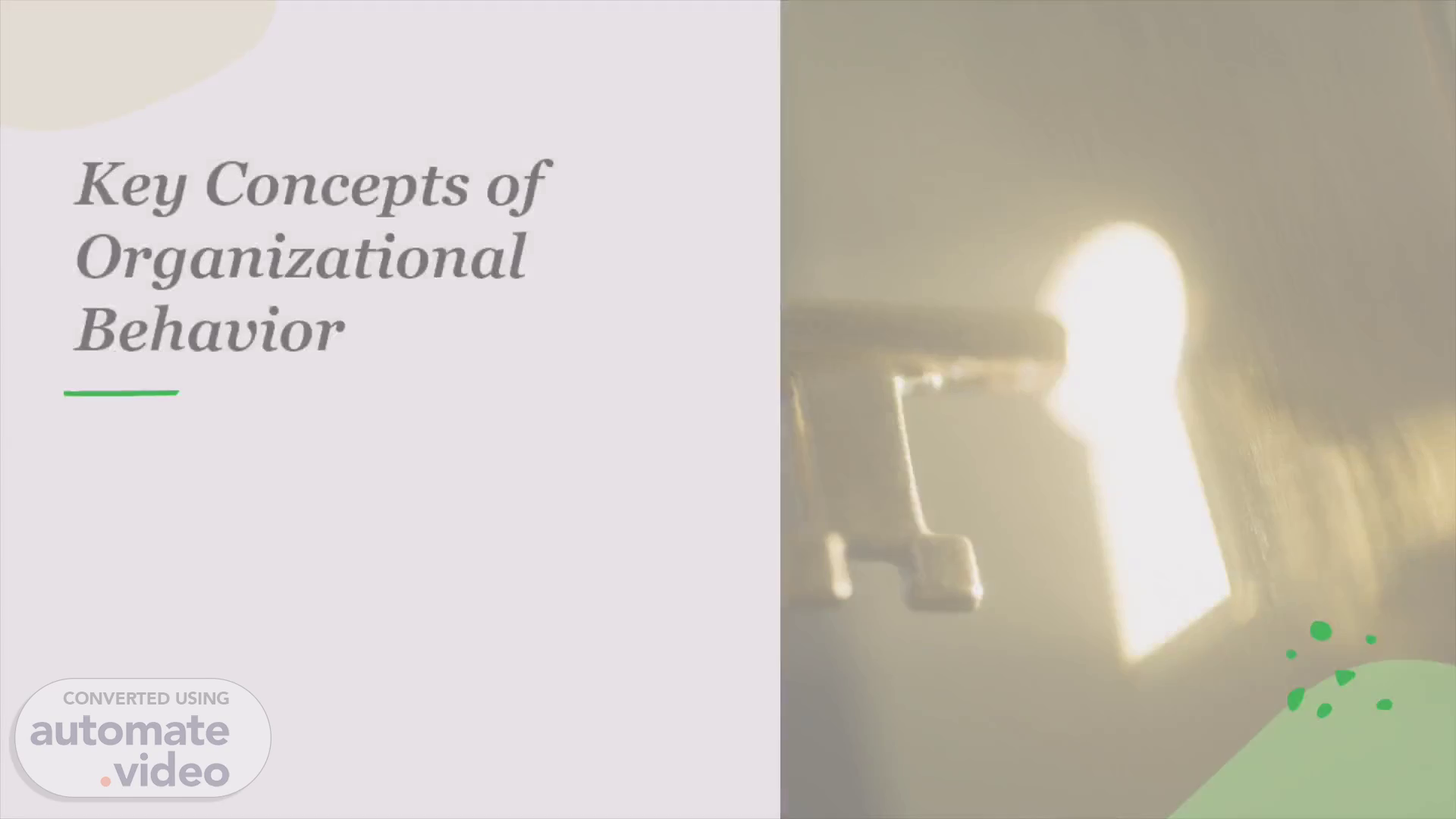
Page 1 (0s)
[Audio] WELCOME TO TOPWORKER. TODAY WE WILL BE DISCUSSING ABOUT KEY CONCEPTS OF ORGANIZATIONAL BEHAVIOUR..
Page 2 (8s)
[Audio] "Organizational Behavior, often abbreviated as OB, is a multidisciplinary field of study that delves into the behaviors of individuals and groups within an organization. It seeks to understand how these behaviors impact an organization's performance and effectiveness." Importance of OB in the workplace: "Why is Organizational Behavior important? OB plays a pivotal role in the workplace by helping us comprehend and manage employee behavior. It contributes to better decision-making, enhances team dynamics, and ultimately leads to overall organizational success." Role of OB in achieving organizational goals: "OB directly contributes to achieving organizational goals. It improves employee satisfaction, leading to higher productivity, and enhances teamwork, leadership, and innovation, which are essential elements in achieving the goals of any organization.".
Page 3 (1m 9s)
[Audio] Individual behavior in organizations refers to how the unique characteristics of each employee influence their actions at work. Understanding individual behavior is vital because it helps organizations tailor their management strategies." Factors influencing individual behavior: "There are three key factors influencing individual behavior: Personality: Each individual's personality traits impact their approach to work and interactions with others. Perception: How employees interpret and make sense of their work environment plays a significant role in their behavior. Attitudes: An individual's job satisfaction, engagement, and overall outlook greatly affect their behavior at work." Example: "For instance, an introverted employee may excel in individual tasks but might need encouragement and support to participate in team activities.".
Page 4 (2m 12s)
[Audio] Overview of group behavior in organizations: "Group behavior focuses on how people interact and collaborate within teams and workgroups. It influences communication, decision-making, and the development of cohesive teams." The significance of effective team dynamics: "Effective team dynamics, marked by strong communication, trust, and shared purpose, are essential for high-performing teams. Such teams exhibit increased productivity and excel in problem-solving." Stages of team development: "Team development goes through four key stages: Forming: During this stage, team members get to know each other and define their roles. Storming: Conflicts may arise as team members assert themselves and establish their positions. Norming: The team starts to develop cohesion and common norms..
Page 5 (3m 16s)
[Audio] performing: In this stage, the team functions efficiently and achieves its goals." Example: "Imagine a project team that starts with members who have never worked together. They begin in the forming stage but eventually become highly efficient in the performing stage after overcoming initial conflicts during the storming stage.".
Page 6 (3m 41s)
[Audio] Discussion on the role of leadership in OB: "Leadership plays a pivotal role in Organizational Behavior as it guides and influences employees. Different leadership styles significantly impact behavior and performance." Leadership styles: "There are various leadership styles, each with its own characteristics: Transformational leaders inspire and motivate employees to exceed expectations. Transactional leaders use rewards and punishments to manage performance. Servant leaders prioritize serving the needs of team members." The concept of motivation and its impact on employee performance: "Motivation is the driving force behind employee behavior. Understanding what motivates employees can significantly boost productivity and morale.".
Page 7 (4m 36s)
[Audio] Theories of motivation: "Two important theories of motivation are: Maslow's Hierarchy of Needs, which suggests that fulfilling basic needs motivates individuals. Herzberg's Two-Factor Theory, which divides factors into satisfiers (motivators) and dissatisfiers (hygiene factors) impacting motivation." Example: "A transformational leader can inspire a team to work extra hours voluntarily, motivated by a shared vision, while a transactional leader might offer bonuses for meeting specific targets.".
Page 8 (5m 14s)
[Audio] The concept of organizational culture: "Organizational culture represents the shared values, beliefs, and norms within an organization. It significantly influences how employees behave and make decisions.".
Page 9 (5m 31s)
[Audio] The importance of managing organizational change: "Change is inevitable in organizations. Effective change management is vital as it helps maintain employee morale and productivity during transitions." Key strategies for managing and implementing change: "To effectively manage and implement change, organizations should: Set a clear vision for change. Involve employees in the change process. Provide necessary resources and training." Real-life examples of organizations with distinctive cultures: "We can see distinctive organizational cultures in real-world examples, such as Google's innovative and collaborative culture and Zappos' focus on customer service and employee empowerment.".
Page 10 (6m 22s)
[Audio] In summary, the key concepts of Organizational Behavior are interconnected and vital for understanding and managing workplace behavior. Understanding human behavior in the workplace is of paramount importance." Mention emerging trends in OB: "As we look to the future, we see trends emerging in the field of Organizational Behavior, including the increased prevalence of remote work, a stronger emphasis on diversity and inclusion, and the use of technology for improved employee engagement.".
Page 11 (6m 55s)
[Audio] Now, we'll open the floor for questions and discussions. Please feel free to ask any questions or share your thoughts on these concepts . Thank You..